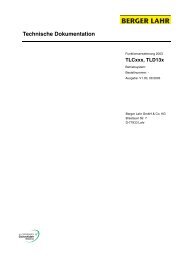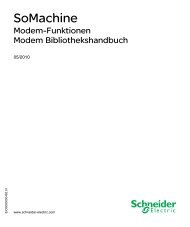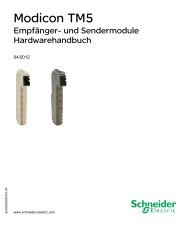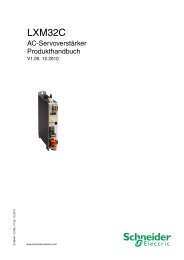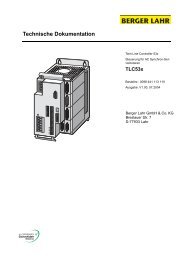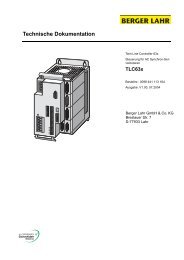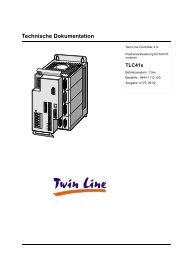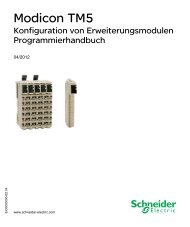Library manual XBTGC PTO/PTWM | 3 MB - BERGER - POSITEC
Library manual XBTGC PTO/PTWM | 3 MB - BERGER - POSITEC
Library manual XBTGC PTO/PTWM | 3 MB - BERGER - POSITEC
Create successful ePaper yourself
Turn your PDF publications into a flip-book with our unique Google optimized e-Paper software.
Special I/O<br />
Local and Special I/O Overview<br />
Introduction<br />
Special I/O Types<br />
The <strong>XBTGC</strong> HMI Controller supports Local I/Os (see Magelis <strong>XBTGC</strong> HMI<br />
Controller, Programming Guide). There are:<br />
12 hardware inputs and 6 hardware outputs for the local I/Os of the<br />
<strong>XBTGC</strong> 1100 HMI Controller<br />
16 hardware inputs and 16 hardware outputs for the local I/Os of the<br />
<strong>XBTGC</strong> 2120 HMI Controller and the <strong>XBTGC</strong> 2230 HMI Controller<br />
The local I/O can be configured as special I/O. Special I/Os include:<br />
High Speed Counter (HSC) (see Magelis XBT GC HMI Controller, High Speed<br />
Counting, XBT GC HSC <strong>Library</strong> Guide)<br />
Pulse Train Output (<strong>PTO</strong>) (see page 27),<br />
Pulse Width Modulation (PWM) (see page 46) output<br />
Pulse Latch Input (PLI) (see page 54)<br />
Special I/O Configuration<br />
Special I/Os are configured in four Groups. Each Group has two inputs (In and In+1 of Group n) and one output (Qn of Group n), as shown in the diagram below:<br />
NOTE: Any remaining I/Os can be configured as normal I/O. (see page 15).<br />
14 04/2012



